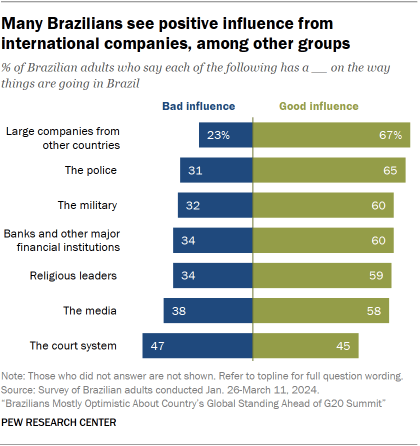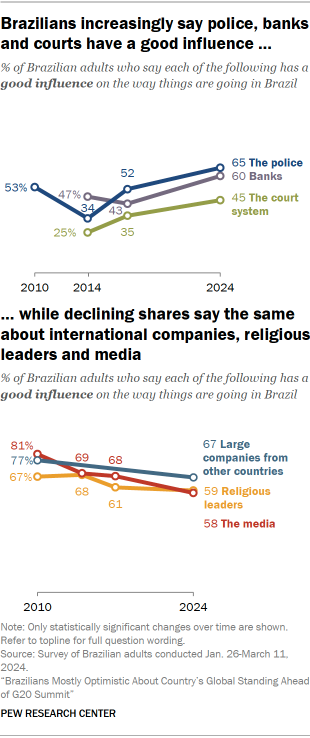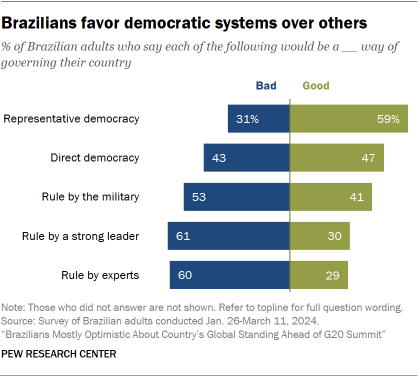Here are key takeaways about how Brazilians see organizations and institutions in their country, as well as their attitudes toward different political systems:
- Majorities in Brazil believe large international companies, the police, the military and other groups have a positive influence in their country. However, while some institutions (such as the court system) are increasingly seen as having a positive influence, favorable views toward others (such as the media) have declined.
- Most Brazilian adults say representative democracy is a good form of government, but there is substantial support for nondemocratic alternatives as well.
Influence of different groups and institutions in Brazil

In general, Brazilians see several organizations as having a good influence in their nation. Two-thirds believe large companies from other countries have a good influence in Brazil, for example.
About six-in-ten or more see the police, the military, banks, religious leaders and the media as having a positive impact on their country.
However, Brazilians are roughly split over the influence of the court system: 45% see it as having a good influence, while 47% say it has a bad influence in Brazil.

(The survey was conducted before the Brazilian Supreme Court voted to uphold a nationwide ban on the social media platform X, and before federal police recommended charges against Bolsonaro for allegedly forging his COVID-19 vaccination records and embezzling jewelry he received while president.)
Brazilians ages 18 to 34 are more likely than older adults to say banks, the court system, international companies and the military have a good influence in their country. For example, 67% of younger Brazilians say the military has a good influence, while 52% of those ages 50 and older agree.
Views of groups and institutions over time
Brazilians’ opinions of the influence these groups exert in their country has shifted over time. For example, the share who believe the police have a good influence in the country has increased significantly since this question was first asked in 2010 (+12 points).
Positive views of the influence of the court system (+20) and banks (+13) in Brazilian society have also increased since those questions were first asked in 2014.
However, the share who see a positive influence from other institutions has decreased: Fewer Brazilians believe the media (-23), large international companies (-10) and religious leaders (-8) have a good influence than said the same in 2010.
Views of different forms of government

We asked Brazilians to evaluate five different types of government systems: representative democracy, direct democracy, military rule, autocracy and technocracy.
Of these, Brazilians see representative democracy most favorably: A majority of adults (59%) believe that representative democracy, a system in which lawmakers are elected by citizens, is a good way to govern their country. About half (47%) also see direct democracy as a good way to govern.
Still, Brazilians’ support for these democratic forms of government is relatively low compared with levels of support measured in other nations, and substantial shares in Brazil also say certain nondemocratic systems would be good ways of governing.
About four-in-ten consider military rule a good way of governing Brazil, and this view is more common among those on the ideological right than the those on the left or in the center. Brazil was previously under right-wing military rule from 1964 to 1985.
Around three-in-ten think a technocracy (rule by experts) or autocracy (rule by a strong leader) make for good ways to govern Brazil.
Views of government systems over time
Support for three of the political systems we asked about has declined since 2023. The share in favor of a technocracy has seen the greatest decline (-13 points), followed by direct democracy (-9) and autocracy (-6). Views of representative democracy and rule by the military have stayed about the same.




